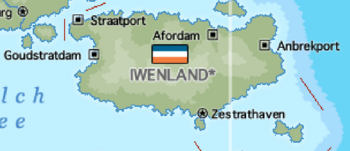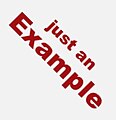Iwenland
Commonwealth of Iwenland Eiweenland (Eiwenish) | |
|---|---|
Coat of arms
| |
 Map of Iwenland | |
| Capital | Zestrathaven |
| Other languages | Eiwenish |
| Demonym(s) | Iwenish Eiwenish |
| Government | |
| Theo van Heemskerk | |
• Prime Minister | Sigrid Floris |
| Establishment | |
• Foundation | 1732 |
• Dolch Conquest | 1816 |
• Independence | 1868 |
| Population | |
• 2022 estimate | 21,000,000 |
| GDP (nominal) | estimate |
• Total | $357 Billion |
• Per capita | $17,000 |
This article is incomplete because it is pending further input from participants, or it is a work-in-progress by one author. Please comment on this article's talk page to share your input, comments and questions. Note: To contribute to this article, you may need to seek help from the author(s) of this page. |
Iwenland (Eiwenish: Eiweenland), officially known as the Commonwealth of Iwenland, is a sovereign state in Argis on Eurth. The island shares maritime borders with Delamaria and Bruxenburg to the north, Dolchland to the west and Seylos to the south. The capital is located in Zestrathaven.
Iwenland had long been the location of maritime states until it was conquered by the Dolch Empire in the 1500s. Following the end of the old Dolch Empire, Iwenland was oficially reformed into the United Provinces of Iwenland. The United Provinces lasted until 1816 when Dolchland reconquered Iwenland. A bloody struggle for independence lasted throughout the Dolch occupation until in 1868 Iwenland finally gained independence, creating the Commonwealth of Iwenland. Iwenland is a parliamentary republic, led by the Prime Minister as head of government and by the Stadtholder as head of state. However, the stadtholder holds mostly symbolic powers. The current Stadtholder is Theo van Heemskerk and the Prime Minister is Sigrid Floris, the first woman to hold the position.
Iwenland is a highly developed nation with a service based economy, its major industries include banking, agriculture and technology with a sizable offshore oil sector. Iwenland maintains a strong welfare state, however it has been accused of being a tax haven by foreign observers. Iwenland maintains its neutrality on the international stage, committing to only economic agreements and refraining from military agreements and expansion. Iwenland was a founding member of the Assembled Nations and hosts the organisation's headquarters in Anbrekport.
Etymology
(WIP. Where does your nation's name come from? Most RL national names come from a small variety of choice. Some examples: land of a tribe (ex.France, Persia, Mongolia, Russia), characteristic geography (ex. Netherlands, India, Morocco), an old ruler or religious figure (ex. Philippines, San Marino, Europa, Saudi Arabia), the Latin description of a place (ex. Australia, Argentina, Liberia). How is the name pronounced? How is it translated into other languages?)
History
(WIP. How did your current nation come to be? What were its previous incarnations? Was it part of a union with a neighbour? Which events shaped the way it is today?)
- Early maritime states. It was a hub of several cultural interactions over the years. Unlike the island of Ceris, it developed a distinct yet linked culture to the countries that surrounded it.
- 1500s: Conquered by Dolch Empire.
- 1732: Independence and reformed as United Provinces. Iwenland has sat between the Anglish and Dolch worlds since it's creation in 1732.
- -1800s: It mostly led a relatively peaceful and uneventful existence, making its way in the wurld as a country of traders up until the 1800s.
- 1814: However, in 1814 the Dolch Empire began to press land claims on the country aggressively, which led to the Dolch-Iwish war. The conflict ended in 1816 with the country occupied by the Dolch.
- 1816: Second conquest by Dolchland.
- 1816-1866: For the next fifty years, the Dolch would proclaim it as part of their greater empire. Continued conflict with Seylos and loss of colonies abroad though eroded Dolch power in the region, and with decentralization on the rise in Dolchland their grip on Iwenland was waning.
- 1867: This culminated in the Iwish Liberation War in 1867, with the people of Iwenland feverishly fighting for their independence again. To make matters worse for the Dolch, other local powers eagerly joined their support in liberating the Iwish.
- 1868: Independence and reformed as Commonwealth. By 1868, the Dolch had been effectively pushed out of the country and forced to sign an embarrassing peace treaty recognizing the independence of Iwenland and further accelerating their decline.
- Still, even today, the newly reformed Dolch Empire under Heinrich Johannes von Ausburg claims Iwenland as part of its core territory. He claims it as an easy target for its new expansions as the country has only a small military since it had been under the protective watch of Seylos and Delamaria.[1]
- 20 August 2022: Dolch Threat Continues to Grow.[2]
- 19 September 2022: Official North Adlantic Union membership negotiations begin.[3]
Geography
(WIP. Landscape. Climate. Where exactly is your nation compared to others on the global map? Describe the landscape, plants and animals. Which mountains and rivers are important to include? Describe are the climate and seasons? How does geography determine where people live? Are there areas separated from one another? How about cities? This will greatly help you with the next part of history.)
Politics
(WIP. Government. Separation of powers. Who rules, how, and for how long? Political parties. What levels of government exist? How about the local level? Who makes the laws? Who deals out your justice? Which government services exist? What is the name of your police? How are the armed forces organised? Foreign affairs, alliances, membership of international organisations.)
Economy
(WIP. Employment. Exports and imports. International partners. Currency. Energy. Transportation. Science & technology. Unemployment numbers. Tourism. Media.)
Demographics
(WIP. Demographics. Ethnic groups. Social classes. Language. Education. Marriage. Religion. Healthcare. Diseases.)
Culture
(WIP. Cuisine. Literature. Visual arts. Art. Architecture. Entertainment. Music & Radio. Television. Cuisine. Local customs. Clothing. Morality. Sports. Stereotypes. Your national symbols such as the flag and national anthem. Public holidays and festivities.)
References
- ↑ Argic NPC Addition (13 August 2022)
- ↑ Dolch Threat Continues to Grow (20 August 2022)
- ↑ Official North Adlantic Union Membership Negotiations Begin (19 September 2022)





